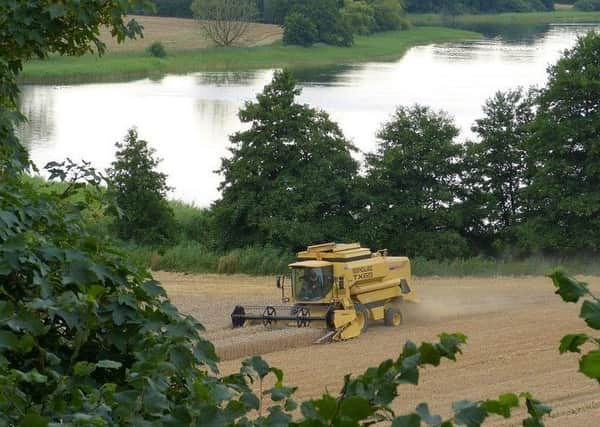Harvest gets off to a good start


The signs are positive for local growers with a good crop in the fields and strong grain prices driven up by supply concerns in the global maize market.
The market has also been supported by concerns about adverse weather affecting quality in the main wheat growing regions of the EU, Russia and North America. This has the potential to put downward pressure on the feed grain price if significant tonnages of milling wheat are downgraded.
Advertisement
Advertisement
“The winter barley crop has benefited from the dry weather and sunshine we have enjoyed over recent weeks resulting in excellent moisture contents with little or no drying required and no concerns about mould growth or mycotoxin contamination. Grain quality is also good and we aren’t seeing any difficulty meeting bushel weights. Wheat crops are also looking good and given favourable weather we can hope for a good crop of quality grain at harvest,” according to Robin Irvine of the NI Grain Trade Association.
“The outlook on prices is very positive for growers with indications that winter barley has traded at around £180 to £185 per tonne delivered and while the wheat harvest is still a few weeks away it is anticipated that wheat prices will also be well up on last year.
“Most of the province’s 60 odd feed mills will aim to source grain from local growers. While the majority of their requirement will be purchased in advance on monthly contracts through the year grain buyers generally adjust their contract arrangements in the harvest months in anticipation of offers of native grain. These transactions are normally based on long term relationships and goodwill rather than formal contracts and depend on good communication between growers and purchasers as to tonnages, quality and timing of deliveries. Millers will require that the grain is quality assured and that each delivery is accompanied by a passport which provides details of storage, haulage and any pesticides used. Quality requirements may vary between buyers but typically a maximum of 15% moisture with a minimum bushel weight of 62 kgs/hectolitre for barley (possibly 64 kg/hl if it is going into pig or poultry feed) and 72kgs/hl for wheat is the accepted standard.
“Looking forward - it is likely that GB will step up as a major supplier of wheat to Northern Ireland following the major reduction in last year’s harvest which massively cut their tonnage for export. Barley will continue to be a popular ingredient for ruminant rations and is particularly competitive in light of the current maize prices. The international grain and feed material markets are likely to stay firm in light of continued strong demand and ongoing weather concerns but volatility can never be ruled out and there are always number of factors which can affect the market sentiment.”